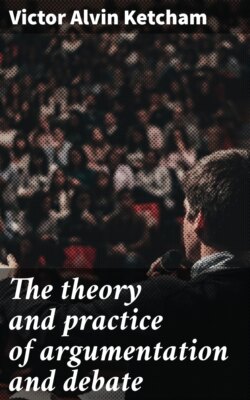Читать книгу The theory and practice of argumentation and debate - Victor Alvin Ketcham - Страница 25
На сайте Литреса книга снята с продажи.
3. Definition of terms.
ОглавлениеBefore proceeding farther it is well to examine each word in the proposition. Now that a general idea of the significance of the proposition has been obtained, and the main point of the controversy reached through the study of the origin and history of the question, the task of defining terms may be undertaken in an intelligent manner.
Let it be understood at the outset that a dictionary definition is not satisfactory. A dictionary gives every meaning which can be attached to a given word and thus covers a broad, general field. But when a word is used in a proposition for debate it is used in a special and restricted sense. The meaning depends largely on the context of the proposition. The origin and history of the question, the meaning which expert writers on this particular subject have attached to the words, and the present conditions must be considered in determining the precise meaning of the terms.
The words of a proposition which need definition are very often so grouped that the meaning of a phrase or combination of words taken as a whole must be determined. Here it is plain that dictionary definitions, even if satisfactory in other respects, would be entirely inadequate. In the question in the last chapter, “Resolved, that monopolies in restraint of trade should be regulated by Federal law,” we find a necessity for the definition of both a term and a phrase. The term “regulate” may not in this instance be given the broad meaning which a dictionary definition attaches to it. We must first look at the context of the proposition in order to find out to what field of authority we should go for a proper definition.
The proposition specified regulation by Federal law; therefore we must go to the law for our definition of the term which indicates the action the law is to take. But even here we need not be satisfied with the broad legal definition of the term “regulate.” The field included by the question is obviously a commercial field. The agencies which would come under this regulation are for the most part engaged in interstate commerce. Therefore the power to regulate would be placed under that clause of the United States constitution which expressly gives Congress the power to regulate commerce. We may then rely upon the definition which the courts have placed upon the term “regulate” when used in this connection. By consulting Black’s Constitutional Law,[1] an eminent authority on this subject, we find that the power to “regulate” has never been held to include the power to destroy. This eliminates a possible meaning. By consulting some of the decisions of the United States courts in which this term has been defined, we are given to understand that to “regulate” commerce implies that “an intention to promote and facilitate it, and not to hamper or destroy it, is naturally to be attributed to Congress.” (Texas & P. R. Co. v. Interstate Commerce Commission, 162 U. S., 197; Interstate Commerce Commission v. Alabama Midland Ry. Co., 74 Fed., 715). Therefore we are warranted in concluding that to “regulate” in this proposition means such control by the Federal law as will promote the best commercial interests of the country at large.
1. P. 194.
It is thus seen that both the definition of the term and the source from which it is taken are determined by the context of the proposition. If the context of the proposition shows that legal definitions are required, legal authorities must be consulted. If the context of the proposition shows that an economic definition is required, economic authorities should be consulted. In whatever field of knowledge the context of the proposition lies, the authoritative definitions generally accepted in these branches of learning should be consulted.
In defining the phrase “monopolies in restraint of trade” the student should consult the same class of authorities utilized in defining the term “regulate.” The generally accepted definitions used by prominent writers may be relied upon with safety, since they are usually taken directly from authoritative reports and decisions.
One of the most important requisites of a definition is that it be reasonable. It must appear, in the light of all the circumstances of the case, to be the most obvious and natural definition which can possibly be produced. In no case must it appear that the speaker or writer has laboriously searched for a definition which will conform to his view of the proposition. Equally fatal is a highly technical definition which ignores its evident meaning. No trickery based upon a technicality should be tolerated. The definition presented must be so reasonable that everyone concerned (with the possible exception of one’s opponents) will willingly admit its validity.
